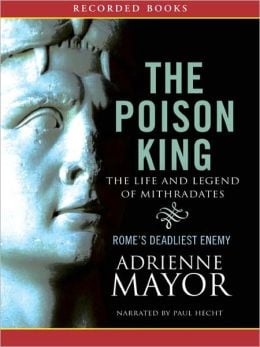In the spring of 88 b.c., dozens of cities across Asia Minor united in a secret plot to kill all the Romans and Italic peoples—man, woman, and child—in their territories. How the plot was kept secret remains unknown, but the massacre was carried out successfully. Ancient sources indicate that almost all Roman and Italic residents of Asia Minor and surrounding islands—at least 80,000—were massacred on a single appointed day. People were killed in their homes, dragged from temples and butchered, and their property was confiscated. This is perhaps the most stunning, and mysterious, mass revolt in Roman history.
The mastermind behind this plot was Mithradates, whose Persian name means “sent by Mithra,” the Iranian sun god. Mithradates, king of Pontus, opposed Roman control of his territories—first through subversive diplomacy and later through guerilla warfare. For decades Mithradates eluded Roman armies, but he finally succumbed after the betrayal of his own people.
Mithradates has long been a subject of fascination for Westerners. In more civilized times, when a man admired his enemy’s accomplishments in addition to criticizing his faults, Europeans did not fall short in their acknowledgment of this “king of kings.” Machiavelli considered him a valiant hero; A.E. Housman, Mozart, and Racine helped to immortalize him. Perhaps the most knowledgeable toxicologist in the ancient world, Mithradates captivated the imaginations of European nobles for centuries in their search for the Mithridatum, the antidote of antidotes. Likewise, if earlier praise for Mithradates was not lacking, neither was criticism of Roman excess and the shortsightedness of Roman imperialism.
Unlike earlier portrayals of Mithradates and the Romans, which are marked by moderation and grounded in a Western perspective, Poison King, a National Book Award finalist by popular historical writer Adrienne Mayor, falls into the category not of historical biography but of postcolonial studies. Unhappy with earlier, more balanced biographies, Mayor presents Mithradates as a biracial (part-Greek, part-Persian) savior of the East. Her book is largely a vilification of everything Roman—the Romans are exhaustively described as greedy, villainous, and barbaric—and a fatuous championing of Mithradates’ revolt against Rome, which, oddly, she attributes not to self-interest but to the pursuit of “Greco-Persian-Anatolian ideals” and “freedom.” (Heaven forbid that Mithradates could have been a Persian realist taking calculated risks!)
Mayor often becomes untethered in her flights of historical speculation. For instance, although little is known about Mithradates’ personal life, Mayor employs modern psychiatric diagnostic tools to demonstrate that he “cannot be labeled a psychopath.” Likewise, she suggests that the conventional account of the death of Mithradates—betrayed by his own and about to be captured by Pompey, he committed suicide—may not be accurate. She conjectures that he may have faked his own death and retired to the steppes with his lover, the Amazon Hypsicratea, who later may have disguised herself as a man and become Hypsicrates, Julius Caesar’s companion.
Mayor’s wanton speculation, and her ideological portrayal of an ancient conflict, may be attributed in part to the fact that she lacks serious graduate training in either classics or history. Yet in earlier times, amateurs accomplished important work in their fields. Many of the original contributors to the Loeb Classical Library were gentlemen scholars of Greek and Latin—bankers, businessmen, and lawyers who spent their spare time pondering the classics. The problem with Mayor is not that she is an amateur but that she is a reflection of our age, a writer who tells people what they want to hear: Westerners are evil, Asiatics noble, and the more fanciful the speculation in regard to her subject, the better. The tragedy is that there are few people around today to tell her she’s wrong.
[The Poison King: The Life and Legend of Mithradates, Rome’s Deadliest Enemy, by Adrienne Mayor (Princeton, NJ: Princeton University Press) 472 pp., $29.95]

Leave a Reply